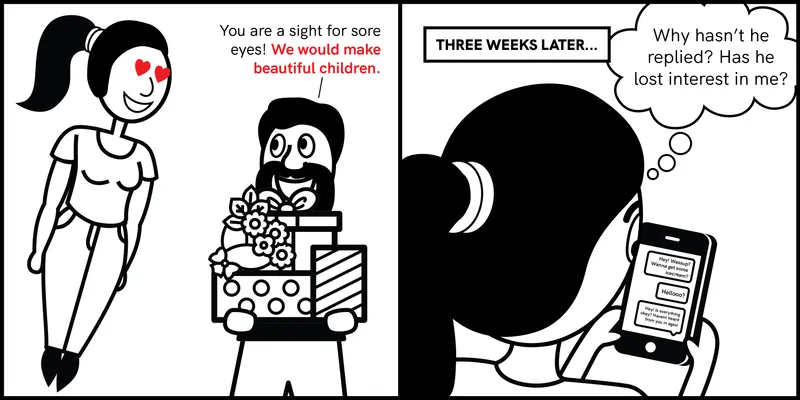Love bombing: A far cry from real love
YS Life dives deep into the subject of love bombing—a form of manipulation that can wreak havoc on relationships. Experts share their views on how to recognise and deal with it.
Aakanksha Verma (name changed), an advertising professional in Kolkata, received a request from a good-looking man on Instagram. Without a thought, she immediately accepted it.
Shortly after, he began flirting with Verma, complimenting her on her appearance and physique. She was flattered and continued speaking with him for a few months, before meeting him in person.
When they met, sparks flew between them and Verma was sure he was the one, even if he seemed too good to be true. But, as time passed, the man grew distant and often ignored her calls and avoided meeting her.
When Verma confronted him, he brushed aside the matter saying he had been busy with work. On the contrary, if she didn’t answer his calls or be around when he needed her, he would send her on a guilt trip and hurl abuses at her. After a year, Verma felt emotionally depleted and called it quits.
It took some time for Verma to understand she had been ‘love bombed’, but once she realised it, she became wary of frenzied attention from men she barely knew.
In the age of dating apps, all it takes is a right swipe to get closer to your potential match. If initial conversations move in the right direction, a date is inevitable.
Now imagine you’re all set to meet your love interest for the first time; there’s equal parts nervousness and excitement. And when you finally see them, their overly sweet behaviour leaves you smitten. They dole out compliments every few minutes, making you blush hard.
This pattern continues until you completely fall head over heels in love—only for them to withdraw their attention later on. They may also manipulate you into helping them out financially or gain control over your life—akin to what happens in The Tinder Swindler, a documentary that tells the story of Israeli conman Simon Leviev, who used a dating app to connect with people, whom he later manipulated financially.

Image: Shutterstock
If this, or parts of it, sounds like your situation, you may want to know that you’ve been love bombed.
Love bombed? What does this really mean?
Ruchi Ruuh, a Delhi-based counselling psychologist, breaks it down for us. Love bombing, in simple terms, is giving excessive attention and affection to an individual with the purpose of charming them faster into a relationship than usual.
“This tactic makes the receiving partner dependent and, in many cases, obligated to do things that they may generally avoid,” says Ruuh.
“If you study criminal cases, you will realise that cults, con artists, and similar characters have used love bombing to manipulate people into offering unconditional support, money, sex, and, in many cases, their life too,” she adds.
The trend preys upon people’s fundamental need to belong and be seen, loved and appreciated. When manipulators use and abuse people’s need to gain control, it becomes problematic, observes Ruuh.
With love, from Ladakh: Chefs Vanika Choudhary and Kunzes script a perfect story with indigenous ingredients
A ticking time bomb
While love bombing has always existed, we just weren’t aware of the term. What’s concerning, though, is how it has crept into our lives or that of someone close to us.
“It is more prevalent in the generation that’s heavy on social media usage, where every action of the thumb counts as attention, without putting in real effort,” says Radhika Mohta, a Bengaluru-based matchmaker and relationship coach.
There is a fundamental shift in how we are forming and viewing relationships today. And this is contributing to the constant need and craving for attention and affection.
From texting cute emojis to liking Instagram stories—every act contributes towards the ‘they must like me so much to do this’ belief.
Unfortunately, although we are digitally connected and seen by hundreds, there’s an epidemic of loneliness brewing all over, says Ruuh.
“Finally, when someone nice comes along and showers us with love and affection, we accept it quickly without questioning them.”
Many a time, people find someone attractive and love the flurry of compliments that come their way. So, even if something does not seem to add up and the person seems too good to be true, they decide to give it a shot.

“Everything seems to be moving too fast but you decide to ride the wave and give love a chance,” says Ruuh.
In the long run, people give up a lot of control and autonomy in exchange for the ‘love’ they receive. Eventually, they may end up feeling cheated as the love bomber leaves as soon as their agenda is fulfilled.
“Love bombing allows someone to gain control and make the other person dependent on them in the long run. It’s unhealthy because it gets difficult to maintain personal boundaries,” cautions Mohta.
How to identify love bombing
Love bombing is a pattern exhibited largely by those with narcissistic traits such as a sense of entitlement, grandiosity, lying, cheating and deception. They have a great need to seek validation from their victims and often lack the empathy to understand what their partner must be experiencing, educates Ruuh.
“Love bombers are both possessive and jealous. They have deep insecurities and abandonment issues,” she adds.

Love bombers have deep insecurities and abandonment issues
“In the case of narcissists, while they try to project a grandiose image of themselves, they are hollow on the inside. That’s why love bombing is one of their techniques of giving too much love too quickly, so that the victim starts trusting them completely and doesn’t go away. It is purely about control.”
Mohta reiterates that being available all the time as if they have nothing else to do, giving needless gifts, and taking up a chunk of your time and energy, while isolating you from your friends, are typical signs of love bombing.
Here are a few signs you should watch out for:
- Their stories do not add up, constantly making you feel that something is off.
- There’s inconsistency in their behaviour, communication and attachment style.
- You may receive too much affection, adulation and attention to fast-forward the relationship.
- Talks of your future together may start early on in the relationship.
- They will put you or themselves on a pedestal.
- They could take full control of your day. They may call you all the time or ask you to share personal/intimate details about yourself. It won’t be reciprocated, even if you ask them for it.
- Most of them have a sob story of toxic, manipulative exes who never loved them.
- They have had no long-term relationships or friendships.
- You will also find yourself being gaslighted and manipulated to suit their needs.
- They believe they are never wrong.

A love bomber will ask you to share personal and intimate details about yourself, without reciprocating when you ask them the same
The impact on relationships
Love bombing can be perceived as a form of emotional or psychological abuse. But for a long time, this was never considered an overt problem. Today, with an increasing focus on mental health, more attention is being paid to the subject.
Ruuh says such forms of abuse can have a huge impact on a person’s well-being and their outlook on relationships.
“Short-term effects can be characterised by feelings of confusion, anxiety, shame, guilt, frequent crying, over-compliance, powerlessness, and more,” explains Ruuh.
“In the long run, it can completely alter a person’s personality, drive them to depression, and create phobias and fears. One can also become emotionally numb with years of repeated abuse or turn into an abuser themselves.”
She also says there are people who lean on substance abuse or sex to self-soothe.
This is exactly what happened with Vishesh Sinha (name changed), a Mumbai-based sales manager, who became a victim of love bombing at his workplace.
Sinha got into a relationship with his colleague. Initially, the office romance was exciting. But, over a period of time, she began asking him for money on the pretext of a financial crisis. Sinha continued humouring her requests, only to be duped later.
He felt cheated and couldn’t fathom what had happened to him. To comfort himself, he began binge eating and drinking to the point that he fell sick and was hospitalised. Eventually, after several months of therapy and support from his friends, he managed to recover.
Needless to say, love bombing is harmful as it leaves the person at the receiving end with low self-esteem, self-confidence, and self-worth. They find it hard to trust themselves and connect with someone again.

Love bombing leaves the person at the receiving end with low self-esteem, self-confidence, and self-worth
Ruuh points out that love bombers don’t necessarily subject their partners to toxic behaviour in the initial stage; they do it whenever they want to control their partner’s actions.
Mohta explains the difference between genuine displays of affection and love bombing. “While love bombing can feel intense and uncomfortable, a genuine display of romantic gestures leaves you with a warm and fuzzy feeling.”
Ways to deal with love bombing
It may seem hard to resist love bombing, but it’s possible to not be swayed by it and protect yourself.
Here are some ways to deal with love bombing:
- Stay grounded in reality. When someone showers you with too much affection in the beginning and praises you without even knowing you, don’t believe them blindly.
- Trust your gut feeling. Intuition presents an in-moment judgement to help us steer clear of danger. If it seems too good to be true, it usually is.
- Take time to heal. People who have had abusive parents or an abusive past are more susceptible to love bombing as they are constantly looking for affection and validation. Heal yourself with therapy and inculcate self-love.
- Understand what a healthy relationship looks like. It is based on mutual listening, empathy, regard, compassion and respect. Does your relationship have these?
- See how they treat others. It’s mostly an indication of how they will treat you in the future.
- Do not be afraid to ask hard questions or flag a particularly toxic behaviour.
- Call out their behaviour if the disagreements are often followed by excessive love and no real apology or changed behaviour.
(Illustrations and cover image by Nihar Apte)
Edited by Swetha Kannan







